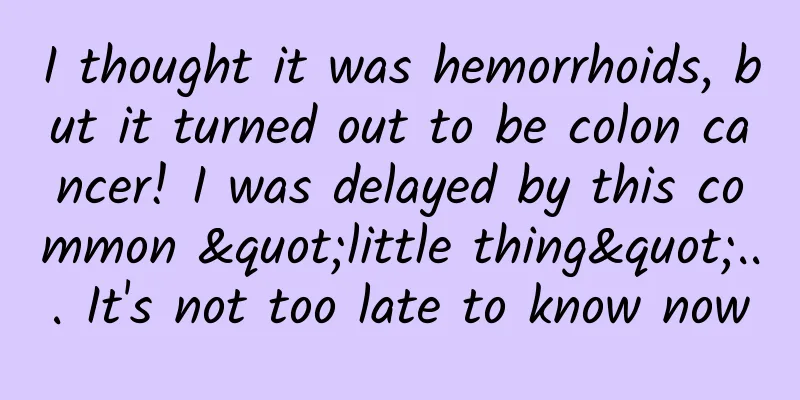I thought it was hemorrhoids, but it turned out to be colon cancer! I was delayed by this common "little thing"... It's not too late to know now

|
Recently there is a hot search about cancer: #Doctors say more than 80% of rectal cancers are initially diagnosed as hemorrhoids#. In clinical practice, there are some cases of rectal cancer where patients have bloody stools for one or two years, but the patients have always assumed that it was hemorrhoids and did not take it seriously, thus delaying the treatment and the disease is already in the late stage. So, what is the relationship between "hemorrhoids" and "rectal cancer"? Let's talk about it in detail today~ Hemorrhoids do not cause colon cancer But the symptoms of blood in the stool can easily mislead judgment Hemorrhoids are very common, and nine out of ten people suffer from them. What are hemorrhoids? Hemorrhoids are essentially caused by congestion or congestion and swelling of the blood vessels (venous plexus) in the anal canal or lower end of the rectum. They can be divided into external hemorrhoids, internal hemorrhoids and mixed hemorrhoids. The main causes of hemorrhoids are due to the downward displacement of anal cushions or varicose veins, bad bowel habits, long-term sitting, etc. Common symptoms may include bleeding during defecation, perianal itching, pain, and prolapse of hemorrhoids. Many people worry that hemorrhoids can cause colon cancer, which is a false causal relationship. In fact, hemorrhoids themselves will not cause colon cancer . As for hemorrhoids themselves, their main harm is: 1 Blood in the stool Hemorrhoids are essentially swollen blood vessels due to congestion or congestion, which may cause bleeding during bowel movements. Long-term chronic blood loss will lead to anemia . Since the blood loss is gradual, many people gradually adapt to the anemia and do not feel any obvious symptoms. They only seek medical attention when the anemia becomes very serious. 2 Misleading judgment This point needs special attention! Because hemorrhoids can cause blood in the stool, many people assume that it is hemorrhoid bleeding and do not take it seriously. But they forget that hemorrhoids can indeed cause blood in the stool, but blood in the stool is not necessarily due to hemorrhoids, it may also be due to other reasons, such as colon cancer. It is not hemorrhoids that cause colon cancer, but colon cancer may also cause bloody stools, and many people take it for granted that their bloody stools are caused by hemorrhoids, which leads to delayed diagnosis and missed the best time for treatment. Therefore, we would like to remind everyone: if you have blood in your stool, you must see a doctor for examination, such as a doctor's examination and rectal examination (digital rectal examination), and colonoscopy if necessary, to find out what causes the blood in your stool, and you cannot assume that it is caused by hemorrhoids. In fact, even if the blood in the stool is caused by hemorrhoids, you cannot leave it alone and allow chronic bleeding. How to prevent bowel cancer First, we need to understand the risk factors for colorectal cancer: 1. Genetic factors . Genetic factors may play an important role in some patients with rectal cancer. 2. Dietary factors: A diet high in animal protein, high in fat, and low in fiber is a risk factor for colorectal cancer. 3. Some non-cancerous diseases such as chronic ulcerative colitis, Crohn's disease, polyposis, adenoma, etc. increase the risk of colorectal cancer. 4. Other factors, such as environmental factors , molybdenum deficiency, long-term exposure to asbestos, and unhealthy lifestyle (sitting for long periods of time, lack of physical activity, overweight, obesity, etc.). For the above factors, measures can be taken to avoid contact or exposure, which can minimize the risk of cancer. For example, arrange meals reasonably, eat more fresh vegetables and fruits and crude fiber foods; develop a healthy lifestyle, do not smoke, do not drink alcohol, eat a balanced and diversified diet, participate in physical activities appropriately, control weight and prevent obesity, etc.; actively treat ulcerative colitis, polyposis and Crohn's disease, etc. Very important reminder: People of appropriate age and high-risk groups should take the initiative to undergo colorectal cancer screening. People over 50 years old should take the initiative to undergo a colonoscopy even if they have no symptoms (it can be appropriately advanced to 45 or even 40 years old, and high-risk groups should have a colonoscopy at 40 years old or even earlier). Planning and production Source: Oncologist Author: Pan Zhanhe, Chief Physician, Master's Supervisor, Department of Oncology, Zhongshan Hospital, Xiamen University Reviewer: Cui Yong, Director of the Third Oncology Department (Radiotherapy Department), Shouguang People’s Hospital, Shandong Province Editor: Yang Yaping Proofread by Xu Lai and Lin Lin |
>>: The creature on earth that can "drink" the most is actually the bumblebee!
Recommend
The national emblem of this country contains a drink that workers must have
The national emblem of the Federative Republic of...
The cute character is actually a master, a hero and a traitor?
In the popular Japanese science comic "Cells...
Business rules for operating e-commerce platforms!
In the future, life will become more and more dif...
Can the iPhone still perform facial recognition when wearing a mask?
As wearing masks has become an important measure ...
How to carry out marketing promotion in the 5G era?
• Introduction• With the advent of the 5G era, th...
What do you think about bringing Face ID to Mac computers?
Face ID is undoubtedly a highlight of Apple's...
The "green" wind of future travel: What kind of sparks will be created when wind meets electric vehicles?
Your browser does not support the video tag Autho...
Why are you so keen on playing the click to read full text game in your circle of friends?
Recently, you may have discovered that your Momen...
Is the Earth getting crooked? This may be because humans are over-extracting groundwater
Produced by: Science Popularization China Author:...
A tomato can cure your procrastination...procrastination?
When studying, have you ever been troubled by the...
VR concept is popular: But watching movies is the rigid demand of smart glasses users at this stage
[[171831]] In recent years, the VR and AR industr...
Are you still afraid of chickens in your 30s? This is not hypocrisy
Audit expert: Yin Tielun Deputy Chief Physician, ...
Optimize your information flow by taking these two steps and the effect will increase!
Today, we will use actual cases to further analyz...
Android 9.0 upgrade is too slow, Google wants users to test Android Q directly
Although after Google released Android 9.0 this y...









